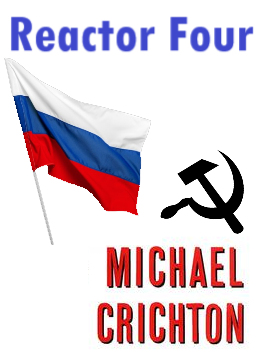Reactor Four: Difference between revisions
Potatoduck (talk | contribs) No edit summary |
Potatoduck (talk | contribs) No edit summary |
||
| Line 42: | Line 42: | ||
}} | }} | ||
'''Reactor Four''' (2000), by Michael Crichton, is an alternative history novel where the Three Mile Island disaster never happens and the Chernobyl disaster is much worse. | '''Reactor Four''' (2000), by [[wikipedia:Michael_Crichton|Michael Crichton]], is an alternative history novel where the [[The Disputed States of America|Three Mile Island]] disaster never happens and the Chernobyl disaster is much worse. | ||
The Story takes place in 2000, 14 years after | The Story takes place in 2000, 14 years after a catastrophic [[wikipedia:Chernobyl_disaster|Chernobyl disaster]] that contaminated much of Ukraine and Belarus. The story itself depicts a Russian family living through a second Russian civil war as NATO and [[People's Republic of China (DSA)|China]] interfere in the conflict. | ||
== Fictional chronology == | == Fictional chronology == | ||
After the Chernobyl disaster kills or uplifts thousands from Ukraine and Belarus, the Red Army overthrows Gorbachev's government, resulting in a collapse of soviet authority and pro-western revolutions within the Warsaw pact. Germany unites under the Bonn government, Poland joins NATO, the Baltics and Ukraine declare independence, and Romania falls into civil war, as does the USSR itself. Russia splits into two groups, Hardline Communists and Reformists, with nationalist groups both siding with the reformists and fighting both factions. By 1995, China has annexed Mongolia and Tuva, eventually establishing Socialist republics in the far east. | After the Chernobyl disaster kills or uplifts thousands from Ukraine and Belarus, the Red Army overthrows [[Mikhail Gorbachev (DSA)|Gorbachev]]'s government, resulting in a collapse of soviet authority and pro-western revolutions within the [[Warsaw Pact (DSA)|Warsaw pact]]. Germany unites under the Bonn government, Poland joins NATO, the Baltics and Ukraine declare independence, and Romania falls into civil war, as does the USSR itself. Russia splits into two groups, Hardline Communists and Reformists, with nationalist groups both siding with the reformists and fighting both factions. By 1995, China has annexed Mongolia and Tuva, eventually establishing Socialist republics in the far east. | ||
== Reception == | |||
The novel became a bestseller, but fell short of Crichton's other works such as Jurassic Park and The Andromeda Strain. | |||
Critics praised the novel's unique premise, while critiquing leaps of logic and real life parallels such as the Soviet Union collapsing due to a Nuclear disaster. [[wikipedia:Gene_Lyons|Gene Lyons]], writing for ''[[wikipedia:Entertainment_Weekly|Entertainment Weekly]],'' called it "a fascinating story, but a childish fantasy". | |||
Revision as of 04:37, 18 April 2024
 | |
| Author | Michael Crichton |
|---|---|
| Country | United Commonwealth |
| Language | English |
| Genre | alternate history, speculative fiction, adventure novel |
| Published | November 2000 |
| ISBN | 0-00-715379-1 |
| 813.77 | |
Reactor Four (2000), by Michael Crichton, is an alternative history novel where the Three Mile Island disaster never happens and the Chernobyl disaster is much worse.
The Story takes place in 2000, 14 years after a catastrophic Chernobyl disaster that contaminated much of Ukraine and Belarus. The story itself depicts a Russian family living through a second Russian civil war as NATO and China interfere in the conflict.
Fictional chronology
After the Chernobyl disaster kills or uplifts thousands from Ukraine and Belarus, the Red Army overthrows Gorbachev's government, resulting in a collapse of soviet authority and pro-western revolutions within the Warsaw pact. Germany unites under the Bonn government, Poland joins NATO, the Baltics and Ukraine declare independence, and Romania falls into civil war, as does the USSR itself. Russia splits into two groups, Hardline Communists and Reformists, with nationalist groups both siding with the reformists and fighting both factions. By 1995, China has annexed Mongolia and Tuva, eventually establishing Socialist republics in the far east.
Reception
The novel became a bestseller, but fell short of Crichton's other works such as Jurassic Park and The Andromeda Strain.
Critics praised the novel's unique premise, while critiquing leaps of logic and real life parallels such as the Soviet Union collapsing due to a Nuclear disaster. Gene Lyons, writing for Entertainment Weekly, called it "a fascinating story, but a childish fantasy".